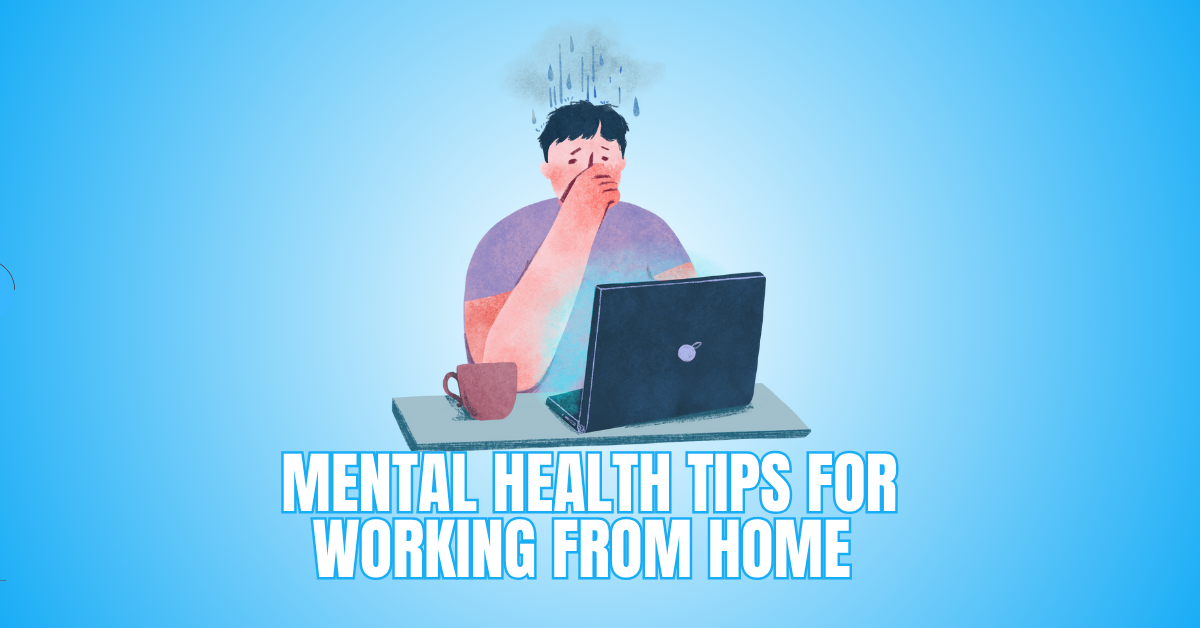Mental Health Tips For Working From Home
Flexibility and comfort are two benefits of working from home, but it can also affect mental health by making it harder to distinguish between work and personal life.
Without the structure of a traditional office, it’s easy to feel isolated, overwhelmed, or burned out. Making mental health a priority is essential to sustaining motivation, output, and general happiness.
In this blog, we’ll explore practical mental health tips for working from home that can help you create a healthier routine, build balance, and reduce stress.
Home Office, Healthy Mind: Mental Wellness For Remote Workers
Working from home offers freedom, but it can also blur boundaries and impact your well-being. This quick guide shares simple, practical tips to help you protect your mental health and thrive in your remote routine.
1. Establish A Routine
Maintaining a consistent routine is crucial for mental health when working remotely. This helps train your brain to transition between work and leisure, reducing stress and anxiety.
Include morning rituals like a short walk, journaling, or a nutritious breakfast. Scheduled breaks and a dedicated lunchtime can provide needed mental resets.
A predictable daily schedule promotes focus, lowers cortisol levels, and enhances emotional stability. Routine is a crucial component of stress management, according to research from the American Psychological Association (APA).
2. Designate A Workspace
A designated workspace supports psychological separation between work and relaxation. When you work from the same space you sleep or unwind in, it blurs mental boundaries, leading to decreased productivity and increased stress.
Select a room with cozy furnishings, adequate lighting, and few outside distractions. Keep this area organized and free from personal clutter.
Neuroscientific studies have shown that our environment significantly impacts our cognitive performance and mental health.
The National Institute for Occupational Safety and Health (NIOSH) states that a dedicated workstation can improve awareness of work-life balance, reduce anxiety, and boost attention.
3. Set Boundaries
Setting boundaries is essential for protecting mental health in a remote setting. When work bleeds into personal time, it can lead to emotional exhaustion and burnout.
Communicate your work hours to colleagues and loved ones, and avoid checking work emails or messages outside of these times.
Establishing boundaries also includes turning off notifications after work and refraining from multitasking with household responsibilities during work hours.
As outlined by the Mayo Clinic, boundaries help preserve mental energy, reduce anxiety, and foster healthier relationships both at home and at work.
4. Take Regular Breaks
Taking frequent breaks throughout the day is one of the most effective mental health tips for working from home to prevent burnout and maintain focus.
Working nonstop can lead to cognitive overload and fatigue. During breaks, stand up, stretch, or do a brief mindfulness exercise.
Short breaks improve concentration, lower stress levels, and encourage a healthier work rhythm, according to the Journal of Occupational Health Psychology.
Avoid the temptation to skip breaks; they are essential for mental recovery and sustained performance throughout the day.
5. Stay Connected
Feelings of loneliness and isolation brought on by remote employment can have a detrimental effect on mental health. Social interaction is a fundamental human need that supports emotional well-being.
Stay connected by scheduling virtual coffee breaks with coworkers or participating in team chats. Regular video calls help maintain camaraderie and reduce feelings of disconnection.
Social support is a protective factor against anxiety and sadness, according to the World Health Organization. Even informal check-ins with friends or family can provide emotional comfort. Building a virtual support network is a proactive step in nurturing your mental health.
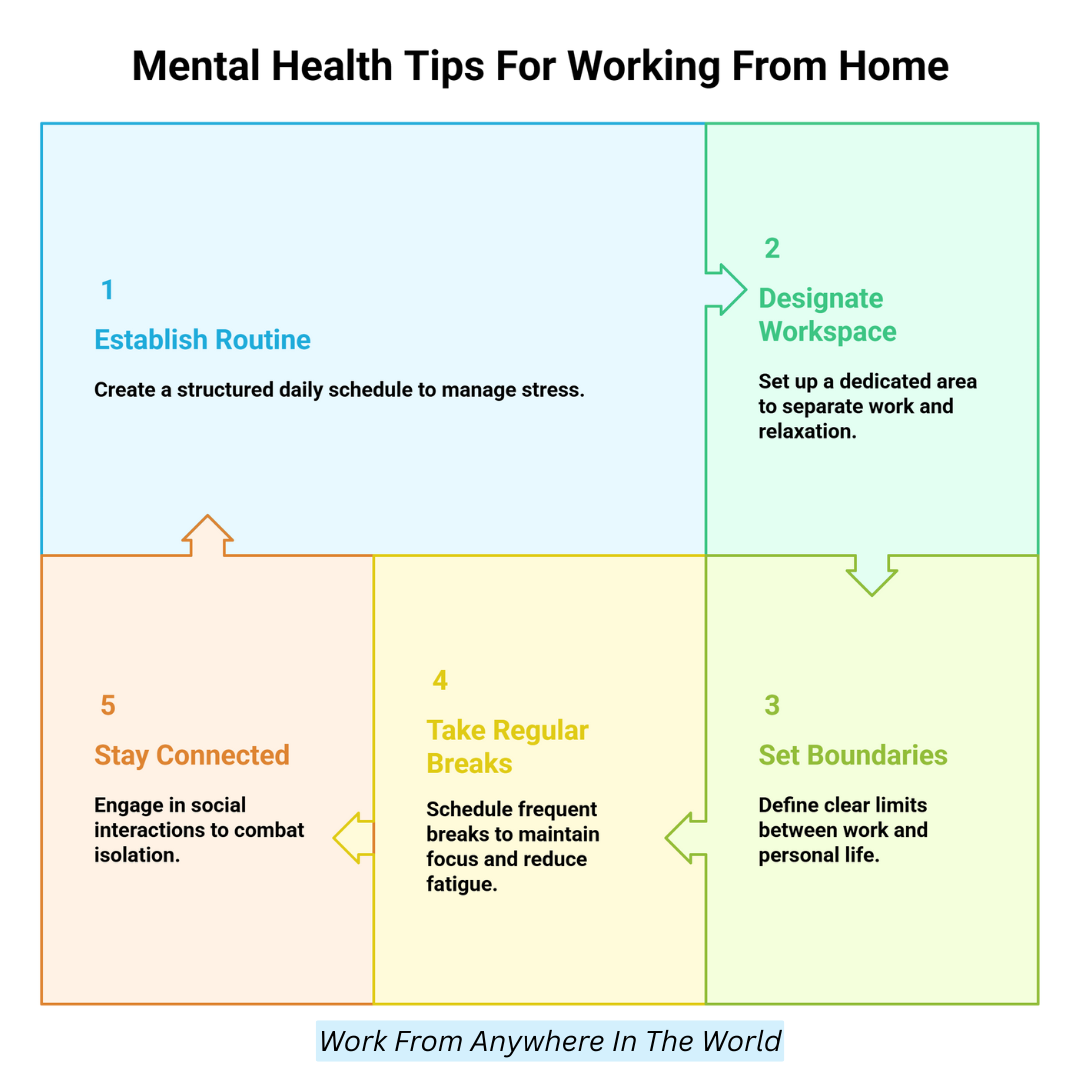
6. Prioritize Physical Activity
One of the best mental health strategies for working from home is to incorporate regular physical activity, which can improve mood and lower stress levels.
Physical activity releases endorphins, the body's natural mood boosters, which help combat stress and improve overall mental health.
Incorporate daily movement, such as walking, yoga, or a home workout. Adults should engage in moderate aerobic exercise for at least 150 minutes per week, according to the Centers for Disease Control and Prevention (CDC). Frequent exercise has been linked to reduced anxiety and depressive symptoms.
7. Practice Mindfulness
Being mindful enables you to manage stress efficiently and remain in the moment. Simple practices like deep breathing, meditation, or mindful journaling can significantly improve emotional regulation and mental clarity.
Apps such as Calm, Insight Timer, or Headspace offer accessible guided meditations for beginners. Research in JAMA Internal Medicine indicates that mindfulness exercises can help those with anxiety, despair, and sleeplessness.
Mindfulness can alter the brain's wiring to become more resilient and emotionally balanced with just 10 minutes of practice per day. Cultivating mindfulness allows you to respond more thoughtfully to challenges rather than reacting impulsively.
8. Eat Well And Stay Hydrated
Prioritizing proper nutrition and hydration is one of the most essential mental health tips for working from home, supporting mood stability and cognitive function.
Eating meals that are well-balanced and include lean meats, fruits, vegetables, and nutritious grains can help to stabilize mood and enhance cognitive function.
You can prevent mood swings and energy slumps by limiting your intake of sweets and caffeine. Water consumption of at least eight glasses per day promotes the best possible cognitive function.
According to Harvard Medical School, the gut-brain connection plays a significant role in emotional health, making nutrition a key component of mental wellness.
9. Get Quality Sleep
Cognitive function, memory consolidation, and emotional control all depend on sleep. Adults should aim for uninterrupted sleep of 7 to 9 hours each night.
Sleep quality can be significantly enhanced by establishing a regular evening routine, reducing screen time before bed, and setting a quiet, dark sleeping environment.
According to the Sleep Foundation, anxiety and depression are more likely to occur when people don't get enough sleep.
10. Limit News And Social Media
Overconsumption of news and social media can lead to increased anxiety and information overload. Establish designated periods for news consumption and refrain from doomscrolling, particularly just before bed.
Curate your feeds to include uplifting, educational, or entertaining content that brings value. The American Psychological Association warns that constant exposure to negative headlines can heighten feelings of helplessness and stress.
Implementing a digital detox or using screen-time management tools can help you stay informed without becoming overwhelmed.
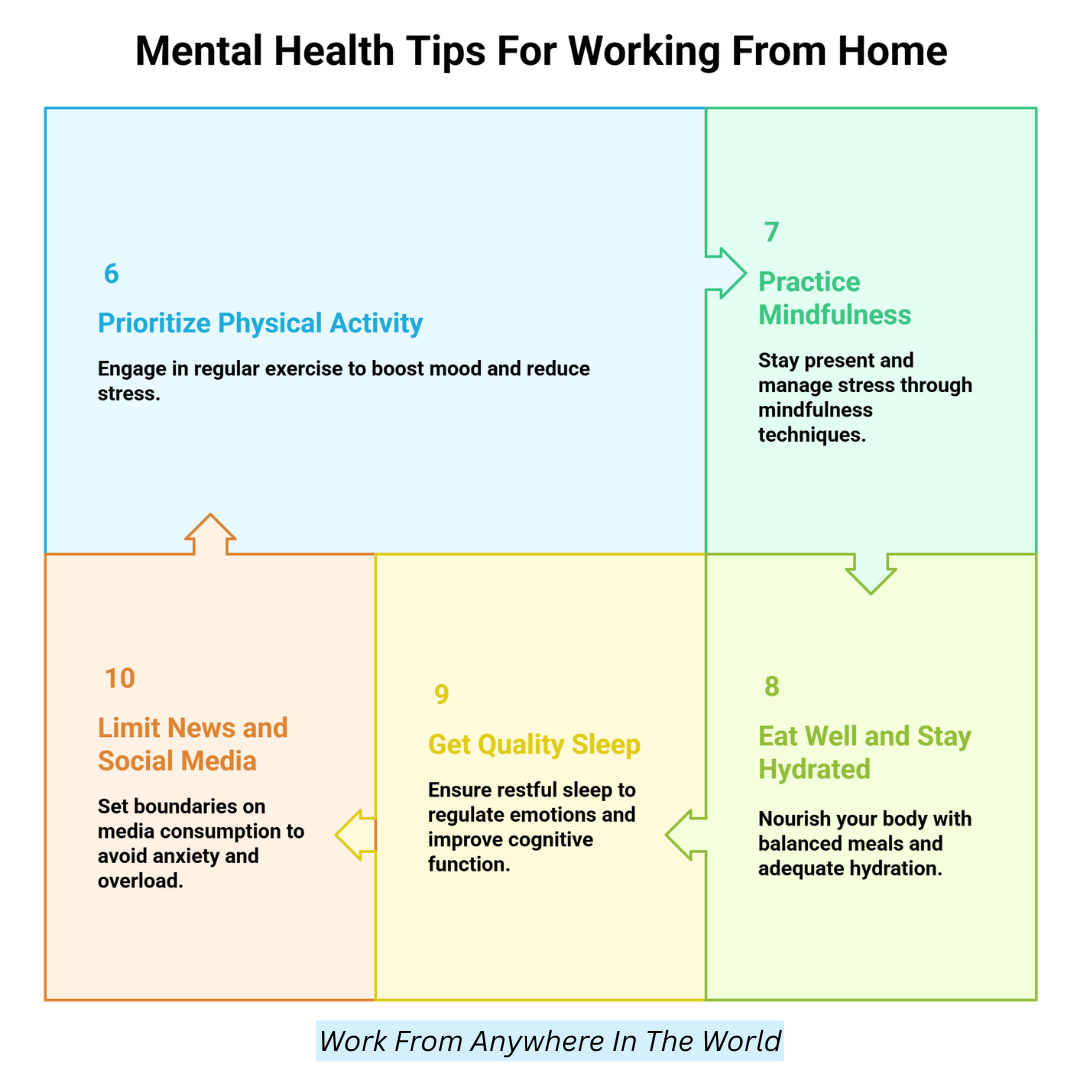
11. Seek Professional Help When Needed
The most important mental health advice for remote workers is to get professional assistance when emotional difficulties become too much to handle.
Remote workers may face unique stressors that exacerbate anxiety or depression. Many therapists now offer virtual consultations, making mental health care more accessible.
If you're experiencing persistent sadness, irritability, or fatigue, professional intervention can provide relief and support. Early treatment greatly improves outcomes, according to the National Alliance on Mental Illness (NAMI). Therapy can give you individualized coping mechanisms and techniques.
12. Celebrate Small Wins
Celebrating small wins is one of the most rewarding mental health tips for working from home, helping to boost self-esteem and maintain motivation.
Remote work often lacks the immediate feedback and recognition found in traditional office settings, so it's crucial to create your moments of appreciation.
Keep a success journal or share wins with a supportive friend or colleague. According to the Positive Psychology Center at the University of Pennsylvania, celebrating achievements releases dopamine, enhancing mood and reinforcing positive behaviour.
13. Practice Gratitude
Gratitude can help you change your perspective and enhance your mental well-being by directing your attention from what is lacking to what is abundant.
Begin or end your day by listing three things you're thankful for. This simple practice has been shown to increase happiness, reduce stress, and improve sleep quality.
Research by Dr. Robert Emmons, a leading expert on gratitude, demonstrates its positive effects on psychological well-being. Gratitude strengthens relationships and reinforces a positive outlook on life, even during challenging times.
Wealthy Affiliate – Mini Review (2025)
If you’ve ever thought about turning your blog, passion, or niche into an online business,
Wealthy Affiliate (WA) is one of the most beginner-friendly platforms I’ve used.
It combines step-by-step training, website hosting, SEO research tools,
and an active community all in one place.
What I like most: you can start free (no credit card needed),
explore lessons, test the tools, and connect with other entrepreneurs
before upgrading. WA isn’t a “get rich quick” scheme — it’s a platform where success comes
from consistent effort and applying what you learn.
14. Avoid Multitasking
One of the finest mental health tips for working from home is to focus on one task at a time and avoid multitasking. This will help you avoid stress and be more productive.
Concentrating on one task at a time allows you to complete it more efficiently and with greater satisfaction. Use tools like task lists or time-blocking methods to organize your workload.
The American Psychological Association claims that multitasking can increase mistakes and decrease productivity by as much as 40%. Prioritizing tasks also enhances your sense of control and reduces overwhelm.
15. Make Time For Hobbies
Engaging in hobbies provides a vital outlet for creativity, relaxation, and joy. Incorporating hobbies into your routine is a valuable mental health tip for working from home that helps reduce stress and boost overall well-being.
They serve as a buffer against work-related stress by shifting focus and encouraging flow states. A study in the Journal of Positive Psychology found that individuals who regularly engage in creative activities experience higher levels of positive emotion.
16. Use Technology Wisely
Technology is a double-edged sword—it facilitates work but can also lead to overstimulation and digital fatigue. Set screen time limits, use blue light filters, and establish “tech-free” times during the day.
Utilize productivity tools like Trello or Notion to stay organized without being overwhelmed by notifications. The World Health Organization emphasizes that mindful technology use can reduce burnout. Thoughtful tech habits protect your mental clarity and help you stay balanced in a digital work environment.
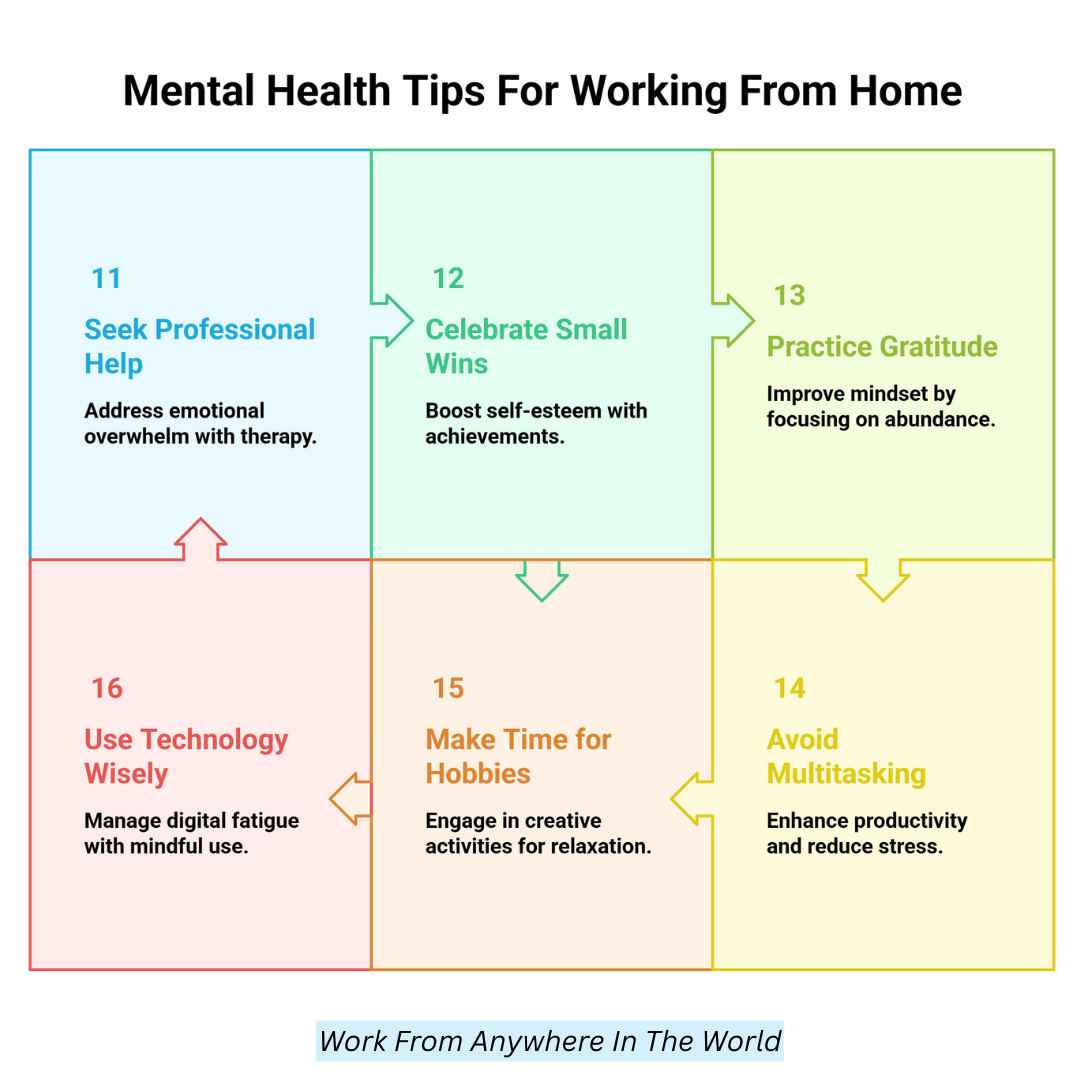
17. Keep A Positive Work Environment
Having a tidy and distinctive workstation is one of the finest mental health tips for working from home since it promotes focus, calm, and emotional well-being.
A clean, organized workspace fosters calmness and focus, while a cluttered space can contribute to anxiety and distraction. Include things that make you happy, such as pictures of loved ones, motivational sayings, or indoor plants.
Research from Princeton University found that a tidy environment improves focus and cognitive performance. A positive work environment is not just aesthetic—it’s a form of self-care that nurtures mental health.
18. Communicate Effectively
Practicing clear and open communication is a key mental health tip for working from home that helps reduce stress and strengthen remote team connections.
Misunderstandings can cause stress and erode team trust. Practice clarity in emails, use active listening during video calls, and don’t shy away from asking for clarification.
Tools like Slack or Microsoft Teams can support transparent communication. The Harvard Business Review emphasizes that open dialogue improves team cohesion and reduces workplace anxiety.
Strong communication skills build connection and trust, which are fundamental to maintaining mental health while working remotely.
19. Plan For Downtime
Downtime is not a luxury—it’s a mental health necessity. Schedule regular breaks and include time for rest in your weekly calendar. Whether it’s taking a walk, reading a book, or simply daydreaming, unstructured time helps your brain recharge.
Research from the University of California, Irvine, shows that downtime improves memory, creativity, and mood. Honour your need for rest as part of a sustainable, healthy work-from-home routine.
20. Reevaluate Regularly
Regularly reassessing your routines and habits is one of the most critical mental health tips for working from home, helping you stay aligned with your needs and well-being.
Set aside time monthly to reflect on what’s working and what isn’t. Journaling or speaking with a therapist might provide valuable insights.
Adjust your schedule, boundaries, or self-care strategies as needed. According to the American Psychiatric Association, self-awareness is a cornerstone of emotional intelligence and well-being.
Reassessing regularly ensures you stay aligned with your values and maintain a mentally healthy remote work life.
21. Volunteer Or Support A Cause
One meaningful mental health tip for working from home is to engage in acts of kindness or virtual volunteering to boost mood and foster connection.
Volunteering, even virtually, reduces stress, combats depression, and improves overall mood. According to research from the National Institutes of Health, acts of kindness trigger the brain's reward system, releasing feel-good chemicals like dopamine.
Whether it’s mentoring a colleague, contributing to an online support group, or donating your time to a non-profit, giving back strengthens social bonds and provides perspective.
22. Embrace Nature Whenever Possible
Incorporating time in nature is an essential mental health tip for working from home that helps reduce stress and enhance overall well-being. Being in natural settings can increase mood, lower cortisol levels, and lessen anxiety.
Even 20 minutes in nature dramatically reduces stress, according to research published in Frontiers in Psychology. Remote workers can benefit by integrating natural light, opening windows, or working outdoors when possible.
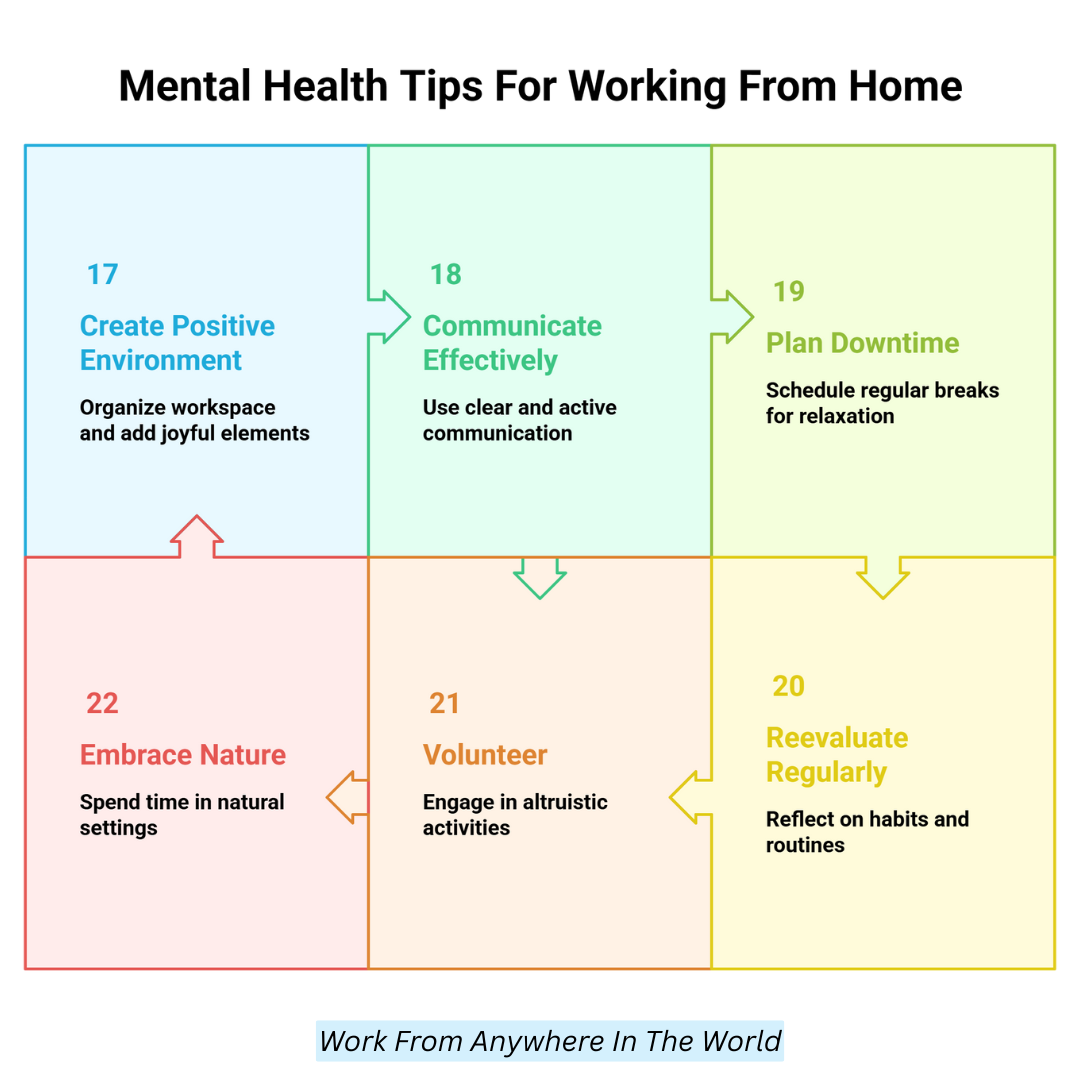
23. Create A “Commute” Ritual
One of the best mental health tips for working from home is to develop a “commute” habit that supports a good work-life balance and helps to establish limits.
This small but powerful ritual signals your brain to switch modes, easing into productivity in the morning and into relaxation afterward.
It mimics the structure of office life while maintaining the comfort of your home environment, helping prevent emotional spillover between work and rest.
24. Use the “Two-Hour Rule”
The “Two-Hour Rule” encourages you to reserve at least two hours each day for activities completely unrelated to work. Whether it’s cooking, painting, exercising, reading, or chatting with friends, these activities replenish your mental energy and boost emotional well-being.
By protecting this time, you maintain a stronger sense of balance and avoid overidentifying with your job. It also reminds you that you’re more than your work, helping prevent burnout and promoting a fuller, more satisfying daily life.
25. Set A “Worry Window”
A “worry window” is a designated time—usually 10 to 15 minutes—when you allow yourself to think about or journal your worries freely. Instead of letting anxiety interrupt your day, you contain it within a small, scheduled space.
This mindful boundary teaches your brain that stress doesn’t have to dominate your entire day. Many find this technique calming because it validates their concerns while also creating structure around how and when they’re processed, leading to greater emotional control and less overwhelm.
26. Name Your Work Persona
Assigning your “work self” a name or persona—such as “Efficient Eric” or “Boss Mode Bella”—can help you mentally shift into professional mode with greater ease.
Making a distinction between your personal and professional lives by naming your work persona is an innovative mental health strategy for remote workers. When it’s time to log off, you consciously leave your work persona behind and return to your home self.
27. Digital Sunset
A “digital sunset” is a set time in the evening when all screens are turned off—phones, laptops, tablets, and even TVs. This intentional unplugging supports mental health by signalling to your body and brain that it's time to wind down.
Cutting back on screen time at night enhances sleep, reduces stress, and frees you from digital distractions to re-establish relationships with loved ones. It creates space for reflection, reading, or creativity, contributing to a calmer, healthier end to your day.
FAQs
1. What Should I Do If I Feel Isolated Or Lonely?
Stay connected through video calls, chats, or virtual meetups. Schedule regular check-ins with coworkers, friends, or family. Joining online communities or interest groups can also help reduce feelings of isolation.
2. How Can I Manage Stress And Burnout?
Practice self-care by prioritizing sleep, healthy meals, and exercise. Use mindfulness or meditation apps to decompress. Don’t hesitate to take mental health days if you’re overwhelmed.
3. How Often Should I Take Breaks During The Day?
Take a 5- to 10-minute rest every hour. Use techniques like the Pomodoro method (25 minutes of work, 5-minute break) to maintain productivity and mental clarity.
4. Can Creating A Morning Routine Improve My Mental Health?
Absolutely. A regular morning routine establishes an optimistic outlook for the day. Include activities like stretching, journaling, or a short walk to boost focus and mood.
5. Are There Apps Or Tools That Can Support My Mental Health?
Yes, apps like Headspace, Calm, and Moodfit offer guided meditations, mood tracking, and breathing exercises. Scheduling tools like Google Calendar can help structure your day.
Conclusion
It is not only advantageous but also necessary to look after your mental health when working from home. By setting boundaries, staying connected, and creating a routine that supports well-being, you can thrive both personally and professionally.
The flexibility of remote work should empower you, not drain you. Implementing these mental health tips for working from home can help you reduce stress, avoid burnout, and maintain a positive mindset.
Never forget that little everyday routines have a tremendous impact. Prioritize your mental wellness, and you'll not only work better but also live better — even when your office is just steps away.
I trust you enjoyed this article on Mental Health Tips For Working From Home. Please stay tuned for more insightful blogs on affiliate marketing, online business, and working from anywhere in the world.
Take care!
— JeannetteZ
💬 Your Opinion Is Important To Me
Do you have thoughts, ideas, or questions? I’d love to hear from you. Please leave your comments below or email me directly at Jeannette@WorkFromAnywhereInTheWorld.com.
📚 More Work From Anywhere Reads
🚀 Ready to Build a Business You Can Run from Home
or from Anywhere in the World?
Imagine creating income on your terms — from home, a cozy café, or wherever life takes you.
With the right tools, training, and community support, it’s entirely possible.
Start your own online business for free — no credit card needed.
Disclosure
This post may contain affiliate links. As an Amazon Associate and participant in other affiliate programs, I earn from qualifying purchases at no extra cost to you. Please read my full affiliate disclosure.

